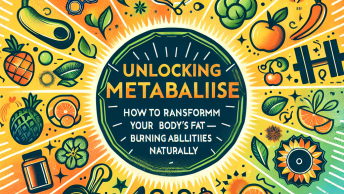Understanding Fat Loss vs Weight Loss: 10 Key Differences You Should Know
When embarking on a journey to improve physical health, people often use the terms "fat loss" and "weight loss" interchangeably. However, they represent different processes and goals. Understanding the distinction can greatly influence the effectiveness of your approach and the sustainability of your results. Here, we break down the core differences through ten key points.
1. Definition and Focus:
- Weight Loss refers to a decrease in overall body weight from muscle, fat, and water.
- Fat Loss specifically targets the reduction of body fat percentage, focusing on retaining muscle mass.
2. Impact on Health:
- Losing excess body fat is associated with numerous health benefits such as improved cholesterol levels, reduced risk of chronic diseases, and better metabolism.
- Simply losing weight, which may include muscle loss, can weaken the body and potentially lead to a lower metabolism.
3. Measurement Metrics:
- Weight loss is often tracked via a scale, which can fluctuate due to various factors like water intake and hormonal changes.
- Fat loss requires more specific measurement tools such as body fat calipers, DEXA scans, or bioelectrical impedance analysis to gauge progress accurately.
4. Dietary Approaches:
- Weight loss is often pursued through calorie restriction alone, which can lead to muscle loss and nutritional deficiencies if not done creatively.
- Fat loss emphasizes nutrient-dense foods, focusing on protein intake to preserve muscle mass while reducing caloric intake from fats and sugars.
5. Exercise Regimen:
- Cardiovascular exercises are often associated with weight loss. However, excessive reliance can lead to muscle depletion unless adequately balanced with nutrition.
- Fat loss strategies incorporate strength training, which helps build muscle and increase basal metabolic rate, aiding in fat loss.
6. Body Composition:
- With weight loss, the change can lead to a "skinny fat" appearance, where individuals may look thin but have a high body fat percentage due to muscle loss.
- Fat loss aims at improving composition by reducing fat tissue while maintaining or increasing muscle mass, leading to a toned appearance.
7. Mental and Physical Energy:
- Rapid weight loss often results in fatigue and a decrease in physical energy due to potential muscle loss and drastic caloric deficits.
- Fat loss, focused on sustainable changes, tends to have less impact on energy levels, provided proper nutritional and exercise strategies are in place.
8. Long-term Sustainability:
- Quick-fix weight loss solutions often result in short-term changes, with a high likelihood of regaining weight.
- Fat loss, integrated with lifestyle changes, is more sustainable, promoting a healthier and more maintainable approach to body composition.
9. Goal Setting:
- Weight loss goals are typically measured in pounds or kilograms lost, which may not accurately reflect body composition improvements.
- Fat loss goals focus on inches lost or body fat percentage reductions, providing a more comprehensive view of health improvements.
10. Psychological Perspective:
- Focusing solely on the scale can lead to frustration due to the natural fluctuations in body weight.
- With fat loss, individuals often witness consistent positive changes in their appearance and performance, boosting motivation and confidence.
Choosing the Right Path for You
Understanding these distinctions isn’t just about terminology; it’s about choosing the method that best aligns with your health goals. If your aim is to improve health markers and enjoy a more toned physique, focusing on fat loss is usually the more beneficial route. However, if overall weight reduction is necessary due to medical advice, ensure your approach maintains muscle mass and doesn’t compromise your health.
For those seeking to delve deeper into tailored fat loss strategies, it’s worth exploring resources that can guide you on this journey. Click Here to learn more to discover methodologies and expert advice that align with a fat-focused, health-conscious lifestyle change.
Conclusion
Choosing between fat loss and weight loss depends on individual goals and health needs. By focusing on fat loss, you are investing in sustainable health benefits and improved body composition. It’s vital to educate yourself about the differences and strategies involved to tailor an approach that delivers results while ensuring long-term health and well-being.






